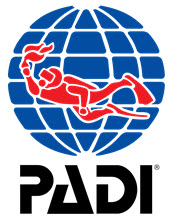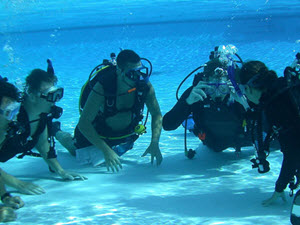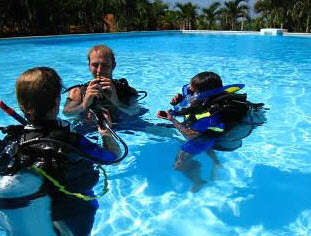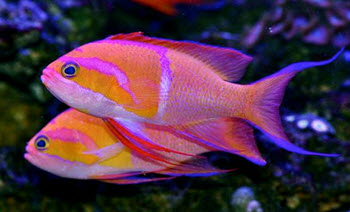Contents
 The Professional Association of Diving Instructors (PADI) is one of the world’s major diver training associations and it offers many different types of certification for recreational divers and professional diving instructors. PADI:s portfolio also includes training programs that does not lead to any certification, such as Discover Scuba Diving, Discover Snorkeling, Discover Rebreather and Discover Tec.
The Professional Association of Diving Instructors (PADI) is one of the world’s major diver training associations and it offers many different types of certification for recreational divers and professional diving instructors. PADI:s portfolio also includes training programs that does not lead to any certification, such as Discover Scuba Diving, Discover Snorkeling, Discover Rebreather and Discover Tec.
Below you will find information about the two most common types of diving certification for new divers: Open Water Diver Certification and Advanced Open Water Diver Certification.
PADI Open Water Diver Certification
PADI Open Water Diver Course is an entry-level diver course. After obtaining this diving certificate, you can proceed to the general PADI Advanced Open Water Course or to one of the more specialized PADI courses that requires a PADI Open Water Dive Certificate.
 The PADI Open Water Diver Course consists of a combination of theory, diving in confined waters and diving in open waters. To enroll, you must be 10 years old or older. No prior experience with scuba diving or snorkeling is required, but you must have adequate swimming skills and be healthy enough. You can download a Medical Statement and Questionnaire from the PADI site.
The PADI Open Water Diver Course consists of a combination of theory, diving in confined waters and diving in open waters. To enroll, you must be 10 years old or older. No prior experience with scuba diving or snorkeling is required, but you must have adequate swimming skills and be healthy enough. You can download a Medical Statement and Questionnaire from the PADI site.
The theory part of the PADI Open Water Diver Course can be carried out online, through independent study or in a classroom at a PADI diving school.
As a part of the PADI Open Water Diver Course, you will learn how to use basic scuba gear, including a snorkel, fins, scuba mask, regulator, tank and buoyancy control device. Use of other gear, such as a full or partial wet suit, can also be included in the course depending on the conditions where you dive.
PADI Scuba Diver
If you are interested in eventually obtaining a PADI Open Water Certification but is short on time right now, you can opt to take a PADI Scuba Diver course instead. The PADI Scuba Diver course is a subset of the PADI Open Water Diver Course tailored to people who do not have enough time to go through the complete PADI Open Water Diver Course right now and who plan on scuba diving with a dive guide until obtaining the full PADI Open Water Diver Certificate.
After successfully completing the PADI Scuba Diver Course you will be qualified to dive to a maximum depth of 12 meters (40 feet) under the direct supervision of a PADI Professional.
The age requirement for the PADI Scuba Diver Course is 10 years or older. No prior snorkeling or scuba experience is required, but you must have adequate swimming skills and be healthy enough. You can download a Medical Statement and Questionnaire from the PADI site.
Just as the full PADI Open Water Diver Course, the PADI Scuba Diver Course consists of a combination of theory, confined water dives and open water dives. You will however only go through the first three of the five theory sections of the PADI Open Water Diver Course. You will only do the first three dives of the five dives in confined water included in the PADI Open Water Diver Course, and when its time to venture into open waters you will only do the first two dives of the four ones included in the PADI Open Water Diver Course.
You will learn to use the same equipment as in the PADI Open Water Diver Course, including snorkel, fins, scuba mask, regulator, tank, buoyancy control device and any other gear necessary in the environment where you are diving (e.g. a wet suit).
PADI Advanced Open Water Diver Certification
 Once you have received your PADI Open Water Diver Certification, you can proceed to the PADI Advanced Open Water Diver Course to deepen your knowledge and skills. (There are also more specialized PADI courses that you are eligible for once you have your PADI Open Water Diver Certification, such as the Rescue Diver Course and the Emergency First Response Provider Course.)
Once you have received your PADI Open Water Diver Certification, you can proceed to the PADI Advanced Open Water Diver Course to deepen your knowledge and skills. (There are also more specialized PADI courses that you are eligible for once you have your PADI Open Water Diver Certification, such as the Rescue Diver Course and the Emergency First Response Provider Course.)
Some people mistakenly believe that the PADI Advanced Open Water Diver Course is for divers that are already advanced divers. This is not true; the course has been designed for divers that have gotten their PADI Open Water Diver Certification and now want to learn more.
The PADI Advanced Open Water Diver Course will help you expand your scuba skills by giving you opportunities to gain more experience and participate in adventure dives under the supervision of a PADI Instructor.
You need to be 12 years or older to take the PADI Advanced Open Water Diver Course. If you are a young diver, there may be certain Adventure Dives that you can not participate in. Check with your PADI Instructor to find out more.
For information about health requirements, visit the PADI site and download the PADI Medical Statement and Questionnaire.
The PADI Advanced Open Water Diver Course is not just a way of fine-honing your general scuba diving skills, it is also a great way of finding out more about various specialty dives that you may be interested in exploring. After you have completed the PADI Advanced Open Water Diver Course and received your Advanced Open Water Diver Certification, you can investigate these specialties more through PADI Speciality Dive Courses. In many cases, Adventures Dives that you have participated in during your PADI Advanced Open Water Diver Course will give you credit toward the first dive of the corresponding PADI Speciality Diver Course.
Five Adventure Dives
 When you sign up for a Advanced Open Water Diver Course, you get to chose three Adventure Dives from a list of available Adventure Dives. There are also two Adventure Dives that are always included in the course: Deep Dive and Underwater Navigation Dive. This makes five Adventure Dives in total for the duration of the course.
When you sign up for a Advanced Open Water Diver Course, you get to chose three Adventure Dives from a list of available Adventure Dives. There are also two Adventure Dives that are always included in the course: Deep Dive and Underwater Navigation Dive. This makes five Adventure Dives in total for the duration of the course.
For the Deep Adventure Dive you need to learn how to plan and carry out a deep dive, taking various challenges and physiological effects into account.
For the Underwater Navigation Adventure Dive, your task will be to refine you compass navigation skills and learn more about how to use kick-cycles, visual landmarks and time to aid in navigation.
What other Adventures Dive that will be available to you varies from one dive school to another. Examples of popular and commonly available Adventure Dives are photography, fish identification, buoyancy control, boat dive, night dive and wreck exploration. More unusual options are dry suit dive and sidemount.

